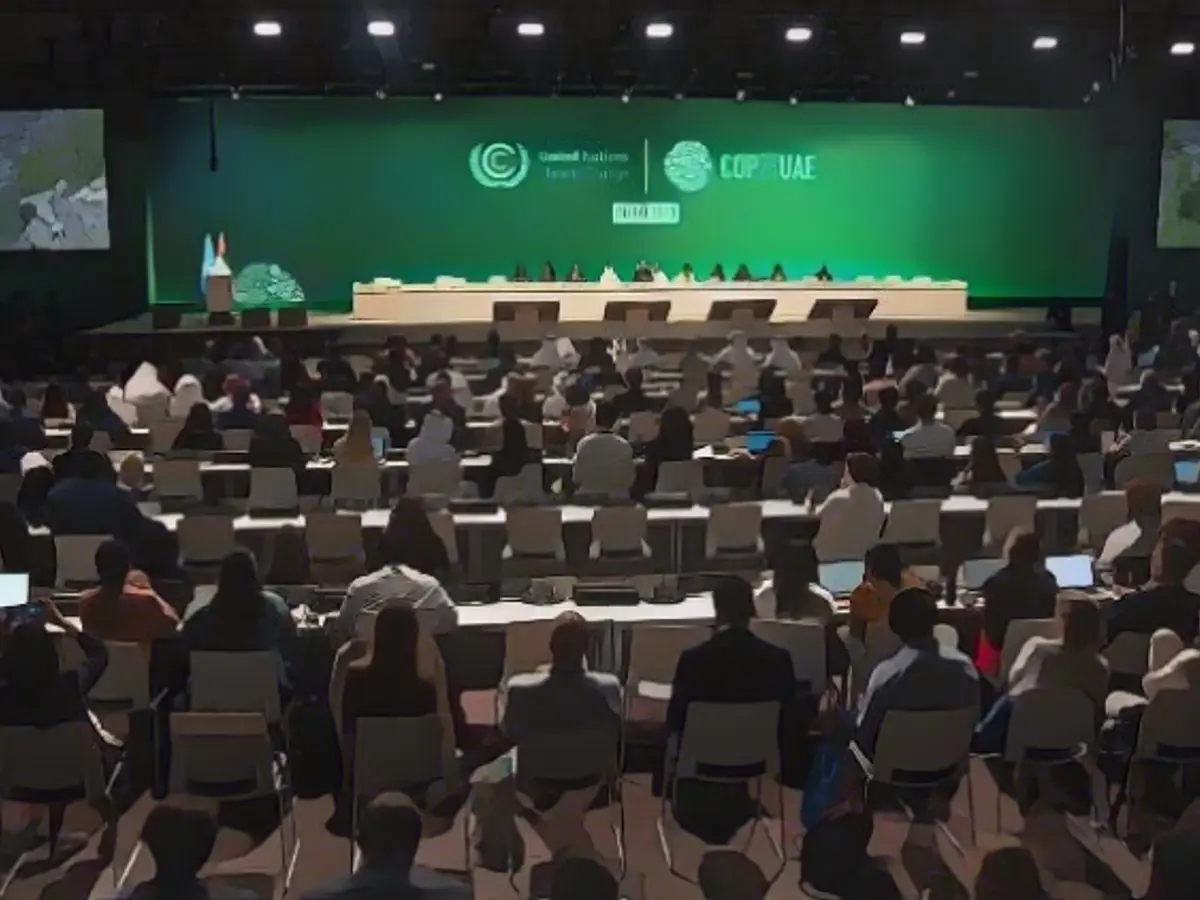Fireworks Fly at Dubai's Climate Summit Over Fossil Fuel Phaseout
A heated debate is playing out at the UN Climate Change Conference in Dubai as nations squabble over the phaseout of fossil fuels. The EU and the USA are pushing for a swift transition, while countries such as Saudi Arabia and India are holding their ground, unwilling to budge from their fossil fuel reliance. Amidst the tension, UN climate chief Simon Stiell delivered a blunt warning against settling for the bare minimum.
In a straight-talking address, Stiell branded the current draft of the final document, known as the global stocktake, as a "hodgepodge of wish lists." He challenged the negotiating parties to gear up and officially agree to gradually phase out coal, oil, and gas, with around 100 countries currently backing this move. However, the path ahead is anything but smooth.
Saudi Arabia and India, two significant opposition forces, are adamant on maintaining their stance. The former, an oil-rich nation, and the latter, heavily dependent on coal, are reluctant to entertain calls for a departure from fossil fuels. As the world waits with bated breath, COP28 teeters on the brink of either ushering in a new era of climate protection or ending in a stalemate.
Germany, a key EU member, remains hopeful but realistic. EU Commissioner Wopke Hoekstra acknowledged the challenges up ahead but reaffirmed the EU's stance on the phaseout of fossil fuels. The US, too, has joined the fray, with US climate envoy John Kerry pledging to reduce climate-damaging greenhouse gases to virtually zero by 2050. However, Kerry conceded that fossil fuels would still be necessary in certain sectors, such as cement and steel production, but with carbon capture and storage.
This unfolds against the backdrop of the report on the global carbon budget, which reveals concerning trends. CO2 emissions are projected to hit a record high of 36.8 billion tons in 2023, representing an increase of 1.1% over 2022 and 1.4% over 2019.
Related Reads:
As the clock ticks down on COP28, the stakes have never been higher. With polarized interests and a race against time, the world is holding its breath for a nerve-wracking showdown over fossil fuels in Dubai.
Behind the Scene Insights:
To successfully phase out coal, oil, and gas at COP28, nations must tackle both the technical and political hurdles:
- Global Leadership: The UAE, as the host nation, can lead by example by reducing its fossil fuel production and consumption.
- Scientific Data: Emphasize the urgency of reducing emissions to keep the 1.5°C temperature goal in check.
- Differentiated Responsibilities: Recognize the varied capabilities of nations and propose a fair transition timeline.
- Financial Support: Provide funding for renewable energy and adaptation measures to developing countries.
- Carbon Markets: Encourage carbon trading mechanisms for clean energy projects.
- Non-Market Approaches: Utilize non-market methods like capacity building and technology transfer to foster change.
- Global Unity: Foster international cooperation to support transition plans.
- Inclusive Transition: Ensure a fair and just process for workers and communities dependent on fossil fuels.
- Accountability: Use the Global Stocktake mechanism to monitor progress and hold nations accountable.
- Technology Transfer: Facilitate the sharing of advanced technologies to help nations build a low-carbon economy.
By implementing these strategies, nations can forge a robust plan for the phaseout of fossil fuels, addressing the concerns of all parties and paving the way to a sustainable, low-carbon future.
Enrichment Data:
At COP28, several countries and groups have distinct positions and strategies regarding the phasing out of fossil fuels:
- EU Position:
- The EU is pushing for decisive action and commitments to transition away from fossil fuels. They advocate for developed countries to deliver on their climate finance commitments, specifically the $100 billion annual target for developing nations. The EU also supports including fossil fuel language in the finance goal text to maintain efforts to phase out inefficient fossil fuel subsidies[2].
- USA Position:
- The US is emphasizing key priorities, such as reaffirming historic decisions and encouraging continued mitigation efforts. The US has, however, been less vocal on specific COP28 goals, focusing instead on collective action[2].
- Saudi Arabia Position:
- Saudi Arabia has criticized the "top-down approach" to new targets being imposed by developed countries. They argue against opening the mitigation work program for reinterpretation and do not seek new targets imposed upon them[2].
- India Position:
- India is focusing on its green energy transition, with ambitious plans to retrofit or close 65% of its coal units by 2025 and generate 80% of electricity from renewable energy sources by 2030[3][5]. India also stresses the importance of developed countries fulfilling their climate finance commitments to enable more ambitious Nationally Determined Contributions (NDCs) in developing countries.
- Global Cooperation and Challenges:
- The UAE Presidency at CO28 aims to accelerate the energy transition in a fair, equitable, and systematic manner. They emphasize the need for reducing fossil fuel emissions and increasing cost-effective, zero-carbon alternatives. However, addressing Scope 3 emissions, which include emissions from fossil fuel use and consumption, presents a significant challenge. The UAE proposes that both producers and consumers should be held responsible for these emissions[1].
- Financial Commitments and Accountability:
- Developed countries have failed to deliver on their $100 billion annual climate finance commitment. Developed nations, such as the EU, are pushing for this target to be met, while developing countries, like India, remind them of their responsibilities[2].








